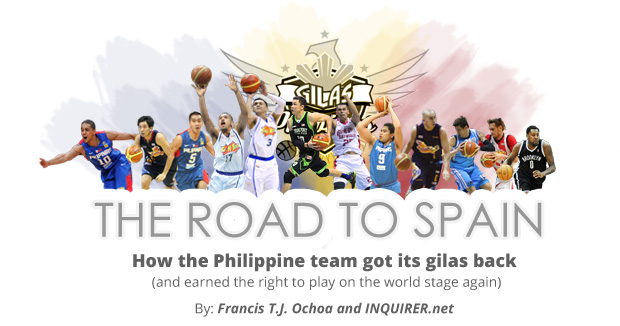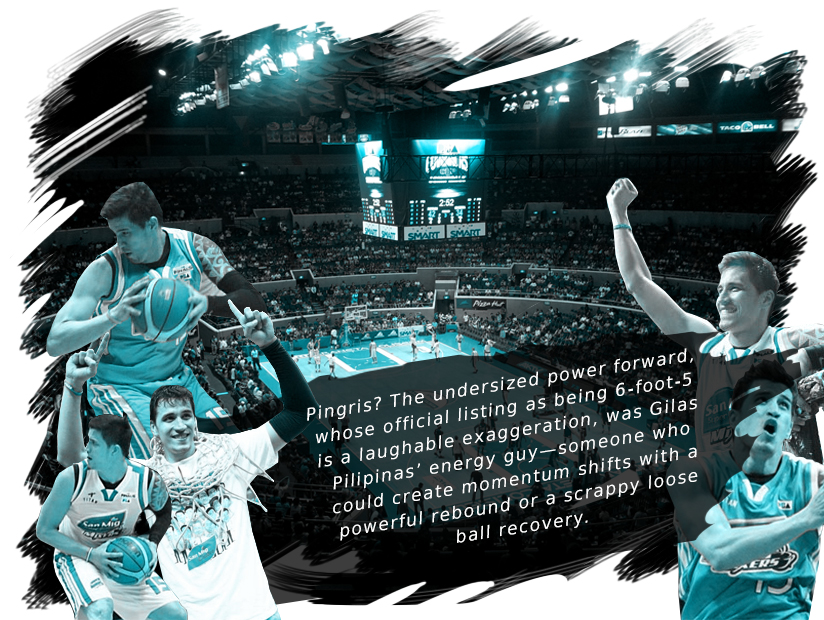Marc Pingris, on the edge
At halftime of the most important game of his life, Marc Pingris was sitting at one end of the Gilas Pilipinas bench—and on the edge of his threshold for pain. He sat with his elbows resting on his knees, his hands clasped, and stared at the floor.
August 10, 2013. Day 10 of the 27th Fiba Asia Championship.
Of all the days that would define Gilas Pilipinas’ dream to make it back to the world stage, Day 10 was the most crucial. The day after that? The last day of the Asian qualifier for the 2014 Fiba World Cup didn’t mean as much as the 10th day. Anyone remotely associated with the team or cheered for the team knew that if things went wrong on Day 10, that dream would die.
And this was a bad place for the dream to die: At home, in front of an adoring and passionate throng of supporters, at the hands of a most despised basketball tormentor.
But at halftime of Team Philippines’ scheduled game on Day 10, the dream looked headed for another painful end. Marcus Douthit, a 6-foot-11 center from New York legally granted Philippine citizenship for the purpose of anchoring this squad against the giants of the Asian basketball scene, was hurt. And though no one was telling the team the extent of his injury, the way he limped off the court with five minutes left in the second quarter and the way he grimaced in pain as team personnel attended to him on the bench left no doubt in anyone’s mind that he was not going to return.
“Oh, wow,” Manny V. Pangilinan, chief of the country’s national basketball federation, thought after Douthit limped off. “How are we going to survive this one?”
“I stayed in my seat during halftime,” said lawyer Jomar Castillo. “I did see [Pingris] slumped on the bench with his head down. I was just staring at the court feeling forlorn. [Later,] I saw Marc and Marcus limping one after the other.”
If the Filipinos were to survive Day 10, they were going to have to do it on their own—against the team that had caused the Philippines so much basketball heartache in the past. If the Filipinos were to survive Day 10, Pingris needed to play a key role.
Ranidel de Ocampo, the stretch four who was easily the next best big man for Gilas Pilipinas after Douthit, was already trying to shake off a nagging injury. And even though he was still contributing, it was clear he needed help. Japeth Aguilar, the athletic big man who had been a revelation in the tournament, did not have much experience performing in such trying, pressure-cooker moments. Junemar Fajardo, the wide-bodied center, was too raw for the highly skilled front line of the opponent.
Pingris? The undersized power forward, whose official listing as being 6-foot-5 is a laughable exaggeration, was Gilas Pilipinas’ energy guy—someone who could create momentum shifts with a powerful rebound or a scrappy loose ball recovery. In scattered moments during the tournament, Pingris had made his presence felt in his own way. A tip-in. A block. A key rebound. A basket here and there. For the last two quarters of Day 10, however, the Philippines needed Pingris to haul these stunts together and pour them out in a single avalanche.
“Marc had a game that we really needed,” national coach Chot Reyes would later say after the match.
But almost lost in the collective gasp that nearly sucked all the air out of the Mall of Asia Arena after Douthit’s injury on that particular Saturday evening was the fact that some time in the first half, Pingris also hurt himself.
“Natapakan ko yung paa nung No. 11 (I stepped on the foot of player No. 11),” Pingris said. “Na-sprain yung ankle ko (I sprained my ankle).”
From the time he rolled the ankle up until halftime, Pingris didn’t let the sprain stop him. He played through it, resting only when the coaching staff noticed him slightly favoring one leg and subbed him off the court. But because he didn’t complain, people thought he was okay. But as the second quarter reached its final stretches, the pain refused to go away. Worse, it was crawling up to his hamstring area. During dead-ball situations, Pingris would massage his hamstring in an effort to relieve the discomfort. But as time passed and with every rebound or battle for the loose ball, the pain grew worse.
And that’s how he wound up sitting on the edge of the team bench at halftime. After emerging from the dugout break, Pingris headed straight there while the rest of Gilas Pilipinas warmed up for the final two quarters. He sat, head bowed. The sight of the team’s hyperactive forward so deflated—so defeated—was not exactly the kind of balm to soothe the worry that cut through the crowd after Douthit’s exit. But Pingris needed this moment for a little introspection. In the troubled corners of his mind, he surveyed the situation. He knew Douthit wasn’t returning. He knew Gilas Pilipinas was trailing by three points. He knew the country had two quarters left on Day 10 and that those two quarters could make or break a dream shared by an entire nation.
Sure, no one would blame him if he gave up. After all, there was the chance that by playing on, not only would he risk his professional career, he could also hurt the team by taking up minutes that someone not hampered by injury could use. He also knew that the team could win without him, that in a roster filled with heroes no matter where you looked, two absent players would not decide a game.
But this was Marc Pingris. From the stands, his PBA coach, Tim Cone, knew one thing through his association with the player. Pain or no pain, Pingris would play on. He just needed a way to deal with the pain.
Team captain Jimmy Alapag also figured as much: “There was absolutely no doubt in my mind that Marc would get up from where he was seated and continue to play on.” The funny thing about Alapag’s faith in Pingris: It would be validated in a crucial play where the two conspired for the biggest shot of the tournament.
But before that play could happen, Pingris first had to get up from where he was seated and play through the injury. So at halftime of the most important game of his career, at one end of the Gilas Pilipinas bench and on the edge of his threshold for pain, Marc Pingris whispered a prayer.
“Sabi ko, tulungan Niya lang ako wag maramdaman yung sakit (I just asked Him to help me not feel the pain),” said the San Mig Coffee star.
Unknown to him, fans were praying with him: “I was saying a silent prayer, asking for the Lord’s help,” Castillo said. In this country, basketball is a religion in more ways than one.
When the buzzer sounded, when the scoreboard timer burned the final seconds of the halftime break and the teams trooped to their respective benches for one more huddle before the third quarter, Pingris heard his prayer answered.
Literally.
Part 1, up Sept. 1, 9:30 pm, Manila time.


